 W
WThis is a list of members of the National Salvation Front Council, the governing organization in Romania after the National Salvation Front (FSN) seized power during the Romanian Revolution, on December 22, 1989.
 W
WGabriela Adameșteanu is a Romanian novelist, short story writer, essayist, journalist, and translator. The author of the celebrated novels The Equal Way of Every Day (1975) and Wasted Morning (1983), she is also known as an activist in support of civil society and member of the Group for Social Dialogue (GDS), as well as editor of Revista 22.
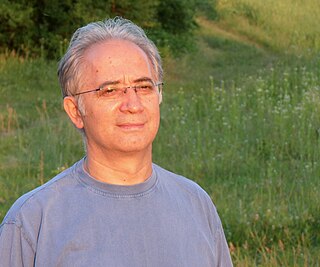 W
WGabriel Andreescu is a Romanian human rights activist and political scientist born on 8 April 1952 in Buzău. He is one of the few Romanian dissidents who openly opposed Nicolae Ceaușescu and the Communist regime in Romania.
 W
WGheorghe Apostol was a Romanian politician, deputy Prime Minister of Romania and a former leader of the Communist Party (PCR), noted for his rivalry with Nicolae Ceaușescu.
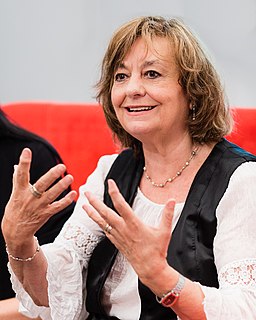 W
WAna Blandiana is a Romanian poet, essayist, and political figure. She is considered one of the famous contemporary Romanian authors. She took her name after Blandiana, near Vințu de Jos, Alba County, her mother's home village.
 W
WEmil Bobu was a Romanian Communist activist and politician, who served as Interior Minister from 1973 to 1975 and as Labor Minister from 1979 to 1981. He was an influential figure in the later years of the Communist regime until his downfall during the 1989 Revolution.
 W
WIon Horia Leonida Caramitru, OBE was a Romanian stage and film actor, stage director, and political figure. He was Minister of Culture between 1996 and 2000, in the Romanian Democratic Convention (CDR) cabinets of Victor Ciorbea, Gavril Dejeu, Radu Vasile, Alexandru Athanasiu, and Mugur Isărescu. He was married to actress Micaela Caracaș and had three sons: Ștefan, Andrei, and Matei Caramitru.
 W
WElena Ceaușescu was a Romanian communist politician who was the wife of Nicolae Ceaușescu, General Secretary of the Romanian Communist Party and leader of the Socialist Republic of Romania. She was also the Deputy Prime Minister of Romania.
 W
WNicolae Ceaușescu was a Romanian communist politician and dictator. He was the general secretary of the Romanian Communist Party from 1965 to 1989, and the second and last Communist leader of Romania. He was also the country's head of state from 1967, serving as President of the State Council and from 1974 concurrently as President of the Republic, until his overthrow and execution in the Romanian Revolution in December 1989, part of a series of anti-Communist and anti-Soviet uprisings in Eastern Europe that year.
 W
WNicu Ceaușescu was a Romanian physicist and communist politician who was the youngest child of Romanian leaders Nicolae and Elena Ceaușescu. He was a close associate of his father's political regime and considered the President's heir presumptive.
 W
WZoia Ceaușescu was a Romanian mathematician, the daughter of Communist leader Nicolae Ceaușescu and his wife, Elena.
 W
WCorneliu (Cornel) Coposu was a Christian Democratic and liberal conservative Romanian politician, the founder of the Christian Democratic National Peasants' Party, the founder of the Romanian Democratic Convention, and a political detainee during the communist regime. His political mentor was Iuliu Maniu (1873–1953), the founder of the National Peasant Party (PNȚ), the most important political organization from the interwar period. He studied law and worked as a journalist.
 W
WDoina Cornea was a Romanian human rights activist and French language professor. She was a dissident during the communist rule of Nicolae Ceaușescu.
 W
WConstantin Dăscălescu was a Romanian communist politician who served as Prime Minister of Romania during the communist rule of Nicolae Ceaușescu until the Romanian Revolution.
 W
WMircea Diaconu is a Romanian actor, writer, and politician. First appearing on stage in 1970, and on screen two years later, Diaconu pursued a lengthy career in both formats, working with a series of prominent directors. He acted in some sixty films through the 2000s, and continued to act in theatre during the ensuing decade. He took part in the Romanian Revolution. In 2008, he entered electoral politics, becoming a senator, and subsequently serving a term as a Member of the European Parliament. In 2019, he ran for president, placing fourth.
 W
WIon Dincă was a Romanian communist politician and Army general who served as Deputy Prime Minister and Mayor of Bucharest under the Communist regime.
 W
WBruno Fonseca was an American artist who shifted between abstract and figurative styles and worked in both painting and sculpture.
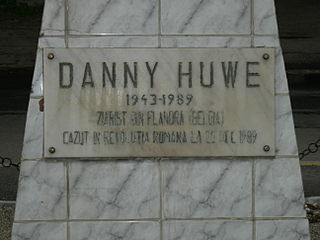 W
WDanny Huwé was a Belgian journalist who was working for VTM, Vlaamse Televisie Maatschappij, at the time of his death. Before VTM he worked as a radio journalist at the BRT for many years together with journalists such as Rudi Dufour, Rudi Vranckx, Mark Ooms, and Piet Deslé. He was killed during the Romanian Revolution.
 W
WIon Iliescu is a Romanian politician and engineer who served as President of Romania from 1989 to 1996 and from 2000 until 2004. Between 1996 and 2000 and also from 2004 to 2008, year in which he retired, Iliescu was a senator for the Social Democratic Party (PSD), of which he is the founder and honorary president.
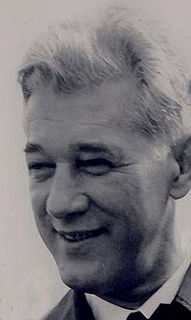 W
WCorneliu Mănescu was a Romanian diplomat born in Ploiești. He served as Minister of Foreign Affairs of Romania from 1961 to 1972 and as President of the United Nations General Assembly from 19 September 1967 to 23 September 1968.
 W
WManea Mănescu was a Romanian communist politician who served as Prime Minister for five years during Nicolae Ceaușescu's Communist regime.
 W
WDumitru Mazilu is a Romanian politician. He had a key role in the events of the Romanian Revolution of December 1989 and in exposing the human rights abuses of the Ceaușescu regime.
 W
WVasile Milea was a Romanian politician and military general whowas Nicolae Ceaușescu's Minister of Defence during the Romanian Revolution of 1989 and was involved in the reprisal phase of the Revolution that caused the deaths of 162 people.
 W
WNicolae Militaru was a Romanian soldier and communist politician. Rising to the rank of general by the 1960s, his ties to the Soviet Union led dictator Nicolae Ceaușescu to question his loyalty and sideline Militaru in 1978. He re-emerged during the Romanian Revolution, when he was made Defense Minister, serving for nearly two months before street pressure forced his dismissal. Days after Ceaușescu’s execution, he was advanced to general of the army. His final public act came in 1996, when Militaru ran for President, barely registering any support.
 W
WAlexandru Mironov is a Romanian science-fiction writer, journalist, and left-wing politician. A former member of the Social Democratic Party (PSD) and Counsel for President Ion Iliescu, Mironov was Minister for Youth and Sport in 1993-1996. Since 2008, he is a member of the minor Romanian Socialist Party (PSR). He is also known as a radio and television presenter and a documentary filmmaker.
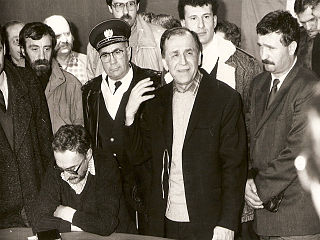 W
WAurel Dragoș Munteanu was a Romanian author and the director TVR following the Romanian Revolution making him a key part of the National Salvation Front's ability to gain support.
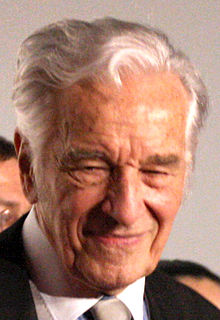 W
WSergiu Florin Nicolaescu was a Romanian film director, actor and politician.
 W
WVictor Rebengiuc is a Romanian film and stage actor, also known as a civil society activist.
 W
WPetre Roman is a Romanian engineer and politician who was Prime Minister of Romania from 1989 to 1991, when his government was overthrown by the intervention of the miners led by Miron Cozma. He was the first prime minister since 1945 who was not a Communist or fellow traveler. He was also the president of the Senate from 1996 to 1999 and Minister of Foreign Affairs from 1999 to 2000.
 W
WVictor Atanasie Stănculescu was a Romanian general during the Communist era. He played a central role in the overthrow of the dictatorship by refusing to carry out the orders of Romanian dictator Nicolae Ceaușescu during the Romanian Revolution of December 1989. His inaction allowed the citizens demonstrating in Bucharest against the government to seize control. In addition, as a defense minister on 25 December 1989, Stanculescu organized the trial and execution of Ceaușescu and his wife, Elena Ceaușescu.
 W
WLászló Tőkés is an ethnic Hungarian pastor and politician from Romania. He was a Member of the European Parliament (MEP) from 2007 to 2019. He served as a Vice-President of the European Parliament from 2010 to 2012.
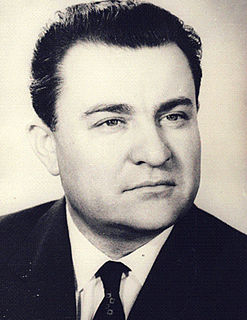 W
WIlie Verdeț was a Romanian communist politician who served as Romania’s Prime Minister from 1979 to 1982.